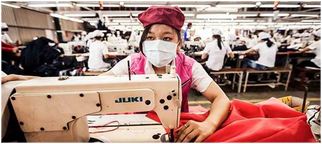COVID-19: G7 Nations Need to Get Gender Equality Right for a Better Future for Women at Work
Извор: WUNRN – 22.05.2020

ILOGENEVA (ILO News) – The International Labour Organization, UN Women and the European Union have called on G7 nations to put in place measures to promote gender equality amid the COVID-19 crisis
Fighting deep-rooted gender inequality must be part of countries’ responses to the pandemic crisis, says high-level meeting on the role of women in the post-COVID future.
14 May 2020 – At a virtual high-level meeting on COVID-19, bringing together government ministers, CEOs, business associations, trade unions, civil society, global women’s movements and academia from G7 countries, participants agreed that women’s economic empowerment should be part of the crisis response.
The pandemic has deepened pre-existing inequalities and exposed cracks in social, political and economic systems including access to health services and social protection. Women with care responsibilities, informal workers, low-income families, and youth are under particular pressure. Since the crisis began, there has been a significant rise in domestic violence.
They called on G7 nations to:
- Design and implement strategies to address COVID-19 related gender issues that are aligned with International Labour Standards, to tackle the new challenges posed to the changing world of work.
- Expand and invest in universal social protection, including effective and affordable access to quality health care, as well as immediate income and food support.
- Ensure that Support to enterprises targets women-owned micro, small and medium-sized enterprises, as well as hard-hit sectors and occupations where women are over-represented.
- Provide health care and other front-line workers with adequate occupational safety and health equipment, training and decent working conditions.
- Allocate additional resources to address violence against women and girls in COVID-19 national response plans.
- Invite businesses to commit to equal pay for work of equal value and zero tolerance against sexual harassment in workplace policy responses.
- Encourage financial stakeholders to accelerate the promotion of responsible business conduct and inclusive corporate cultures that promote gender equality as an effective crisis response.
- Design economic recovery packages that recognize and place a value on unpaid care work and care jobs and provide adequate levels of quality childcare.
- Ensure that girls are included in learning and skills development programmes during and after the crisis.
- Collect gender-related statistics and data to inform crisis response and recovery plans.
“The COVID-19 pandemic has shown the always essential role of the working heroes of this pandemic,” said ILO Director-General, Guy Ryder. “People who are usually invisible, unconsidered, undervalued, even ignored. Health and care workers, cleaners, supermarket cashiers, unpaid carers in their homes and communities – a large majority of women, frequently migrant workers, too often numbered among the working poor and the insecure.”
https://www.ilo.org/global/about-the-ilo/newsroom/news/WCMS_744753/lang–en/index.htm


